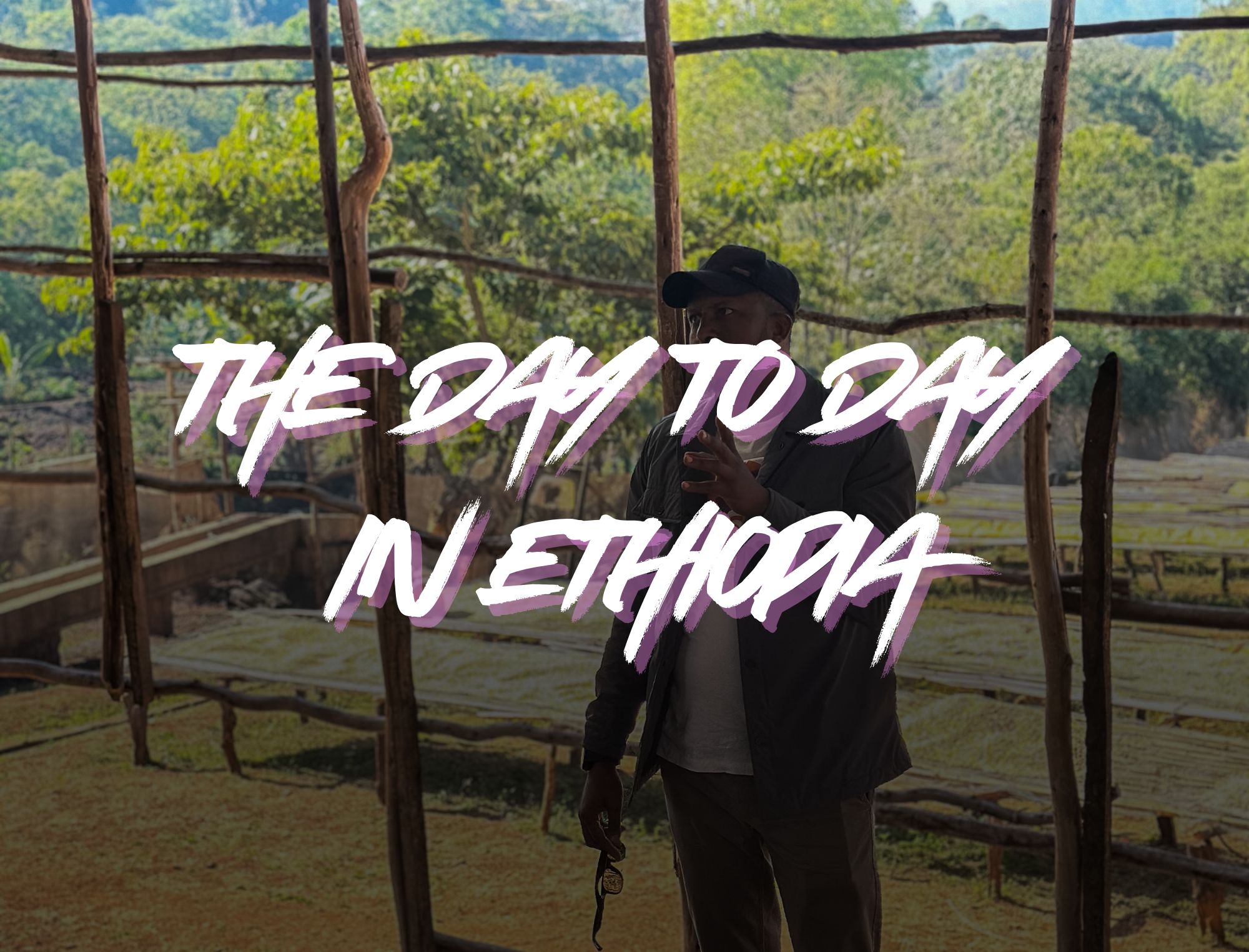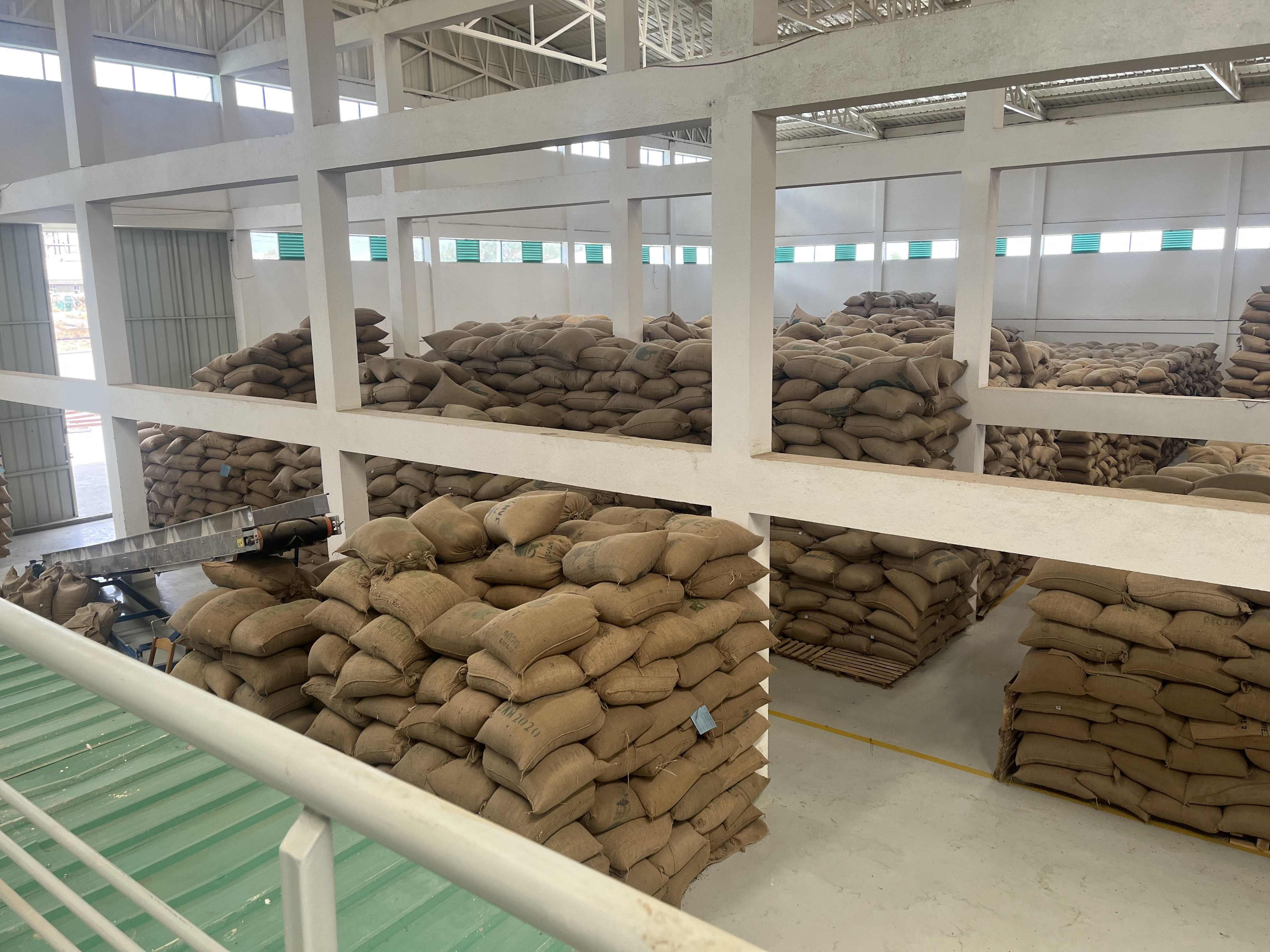Rwanda

An evolving range of washed and naturals, sourced through suppliers that build long-term relationships with surrounding smallholders.
We started sourcing from Rwanda in 2012. While high-quality coffee is available, there is an oversupply of lower-priced Rwandan coffee in the market. As a result, we face challenges in selling larger volumes of premium coffee at the prices that we pay to farmers. To address this issue, we diversify our inventory. Besides sourcing a range of washed coffees, we have introduced some naturals and lower-priced PBs, still at higher premiums to the farmers. This move is part of our effort to effect change and improve the market for Rwandan Coffee.
Harvesting season
March – August
Arrival times
September – November
Quantities
60 kg grainpro bags
Packaging
15 – 50 bag lots
Cultivars
Mainly Bourbon
Processes
Fully washed and naturals dried on African beds either under shade or direct sunlight
Flavour profiles
Red berries, plum, cacao, black berries, florals, & citrus fruit
Usage
Widely used for filters, as single origin espresso and in espresso blends.
Shelf life
Normally holds up well for a year. We can never guarantee more than 6 months after arrival for any coffees.
Our sourcing strategy in Rwanda is based on forging strong relationships with reliable partners. We have been buying from this origin since 2012, and our partners include private producers who own their own washing stations, as well as one producer with a larger farm (estate), a rarity in Rwanda. Our relationships with these producers enable us to connect with smallholder farmers.
Specifically, we have long-standing partnerships with Aime and Alexis from the Gitesi station, and Justin from the Mahembe station. Typically, we buy high-performing microlots from these washing stations, ranging from 15-50 bags in size.
In 2019, we began experimenting with naturals and special preps with the team at Gitesi. We pre-commit to buying these coffees, regardless of the outcome, so that the financial risk is borne by us rather than the producers.
Rwanda is known as the land of a thousand hills, and this is reflected in the wide range of flavour profiles found in its regions. Our coffees can be grouped into three main categories:
- Washed from Mahembe with a super structured body, a heavy focus on fruit with notes of red berries and black currant;
- Washed from Gitesi with lots of complexity, layers of perfumed florals, and a transparent, bright flavour profile;
- Naturals from Gitesi, which are very sweet and syrupy with ripe red fruit, citrus, florals, great brightness, and a bit of funk to back it all up.
While PB beans are typically sold on the local market for a low price, we have found that these lots can truly display distinct characteristics. Consequently, we also purchase PB lots from our reliable partners at a premium.
Our years of working with these producers have demonstrated significant improvements in coffee quality and consistency from season to season.

A step-by-step overview

At our partnered washing stations, the skilled staff effectively manage cherry deliveries with strict sorting routines. Farmers sort their delivered cherries, and if needed, staff further refine the sorting. Prior to pulping, cherries are floated to remove defects and processed separately.
In the Great Lakes region, the Potato Taste Defect (PTD) caused by the Antestia bug is a known issue. Despite efforts like pesticides and thorough sorting, the risk remains due to the bug's bacterial impact. Nevertheless, Rwandan coffee's quality and value outweigh the risk. Our producers implement meticulous procedures in every processing stage to minimise contamination.
There are normally a few hundred smallholder farmers in the local community delivering their cherries to the producers’ washing stations for processing. The producers we work with are strict on the quality of the cherries delivered. If they are not well selected, they must hand sort out the lower quality cherries before the washing station accepts delivery. Competition for cherries can be pretty tough.
Farmers can deliver to whichever washing station they want, so it’s important that the washing stations maintain good relationships with the farmers and offer competitive prices for higher quality. The producers and their washing station managers often have roots and history with the local community, which helps them strengthen their relationships.
The climate throughout most of the season in Rwanda is relatively cool, which assists in controlling the fermentation process. For the washed processed lots, a Penagos 800 Eco Pulper removes the skin, and de-pulps 70% of the mucilage. The coffee is then dry fermented for 10-12 hours. The parchment is then graded and washed in channels. It is separated into two grades based on density, before being soaked under clean water in tanks for 16 hours.
The parchment is initially taken to pre-drying tables under shade. While the parchment is still wet, a lot of hand sorting is done as it is much easier to see defects at this point. For naturals, it is vital to select only the ripe cherries that are picked the same day. For this reason, farmers check their trees several times, picking only ripe cherries and making small, daily deliveries. This is how farmers can earn higher prices, rather than picking once and selling the unripe cherries at a lower price.
Once delivered, the cherries are immediately sorted and floated, then laid out on the drying tables in a single layer, with no overlapping cherries, to ensure even air circulation. The parchment is dried on African drying beds for up to 15 days. The parchment is covered by a shade net during the hottest hours of the day, at night, and when it rains. During the drying period, the team covers the beds with shaded nets when the sunlight is too intense. While the coffee is on the drying bed, a team hand sorts it every day, to remove any defective cherries.
Quality
Rwanda's coffee industry has an abundance of high-quality coffee, but there is an oversupply of lower-priced varieties. To incentivize quality, both Gitesi and Mahembe have implemented premium payment systems for selectively picked cherries.
Additionally, our partners prioritise education programs aimed at improving yield and enhancing overall coffee quality. Mahembe goes a step further by offering an RTC-run agricultural extension program, while Gitesi's comprehensive initiative covers a range of essential topics including farm management and financial literacy. These concerted efforts underscore our commitment to elevating the standard of Rwandan coffee and supporting the growers in their pursuit for quality.
Transparency
Over 60% of Rwandan farmers engage in coffee processing independently, often with limited equipment, resulting in the production of non-traceable, lower-grade coffee that is typically sold through middlemen. To address this challenge, early contracts with RTC involve providing financing for washing stations, ensuring efficient post-harvest processing. This initiative not only enhances the quality of coffee but also establishes a more dependable source of income for smallholder growers.
In Rwanda farmers deliver cherry to washing stations who process and transform it to parchment. Export companies purchase parchment from the washing stations. The “Farm Gate” price in Rwanda is paid for cherries and is therefore lower than the “Farm Gate” price in countries where farmers invest in processing and drying, and deliver parchment or green coffee.
In order to diversify our inventory, we explore options such as lower-priced Peaberry lots and lots processed naturally. Despite the lower pricing, we are committed to purchasing these lots at higher premiums to directly benefit the farmers. Our FOB prices in Rwanda consistently exceed the local market rates for high-quality coffee, providing a stable and lucrative avenue for growers. In competitive seasons, the demand for cherries is intense, with NAEB setting the initial price, leading to spirited competition among washing stations. Stations like Gitesi and Mahembe are advised not to exceed a certain margin above the minimum price to maintain market equilibrium.
They may also offer secondary payments along with additional benefits like farmer training and cow distribution. Despite fluctuations in cherry prices, our FOB price remains steadfast, with RTC rewarding washing stations with additional payments when a buyer offers a premium, subsequently resulting in a second payment to the farmers from the washing stations.
Impact
Our sourcing strategy in Rwanda hinges on cultivating partnerships with Rwanda Trading Company (RTC), with a particular emphasis on key collaborators such as Gitesi Washing Station and Mahembe Washing Station. Aime Gahizi from Gitesi and Justin Musabyiama from Mahembe play instrumental roles in facilitating this process.
On occasion, we may procure coffee from other stations through RTC to meet specific volume requirements, but our primary focus remains on working closely with smallholders to maximise positive impact. We have a steadfast belief in the quality of coffee produced by these smallholders, which translates into providing stable premiums and ensuring that our suppliers reinvest in their respective communities.
By sourcing from Gitesi and Mahembe, we are assured that they actively contribute to the betterment of their local communities. Gitesi's extensive social program covers a range of critical topics including farm management and financial literacy, demonstrating their dedication to fostering strong relationships with the surrounding smallholder farmers.
Similarly, Mahembe places a significant emphasis on enhancing the livelihoods of the farmers they collaborate with. They go above and beyond by giving back to the community in various ways, such as providing local schools with supplies, furnishing children with uniforms, and even constructing a football field for the youth. These initiatives reflect our shared commitment to sustainable, community-focused practices in Rwanda's coffee industry.

About the origin
Rwanda is a small, landlocked country with a very dense population. Even though the economy struggles, it is well-organised, with minimal crime and corruption in comparison to some of its neighbouring countries.
Coffee has been a pillar of the Rwandan economy since the 1930s, with the first seeds introduced by Belgian colonialists. However, the coffee industry was severely threatened by the global coffee price drop in the 1990s, followed by the Rwandan genocide in 1994 which left the country broken and destroyed vital coffee infrastructure.
Fortunately, a lot has changed since then. As the country continues to make progress, we are witnessing an improvement in the quality of its coffee. Rwanda has pushed through government reforms that have made it easier to sell coffee. The country has made a remarkable comeback and is now known as an African powerhouse. Projects run by NGOs like Technoserve have had a huge impact on the way producers manage traceability through the supply chain. We believe this is part of the reason why Rwanda so quickly managed to place themselves on the map as a “specialty” coffee origin.
There are approximately 500,000 smallholder coffee farmers, owning around 170 coffee trees each - a tiny production. Farmers also usually cultivate other crops like corn and bananas. The altitude of farming locations ranges from 1200 – 2100 masl. The producers we collaborate with work at 1700 masl and up.
It is very common for farmers in Rwanda to own just one hectare of land. The farmers deliver cherries to medium-sized washing stations who are responsible for processing and drying the coffee. Washing stations then deliver the parchment to exporters, who cup and grade the coffee, dry mill and export the finished green coffee.
There are about 300 washing stations in the country that generally produce only fully washed coffees. Coffee not processed by a washing station is processed at home and sold as a lower quality coffee at local markets.
Interested in this origin? Talk to your sales rep.





What’s new?
Updates directly to your inbox.
If you buy our coffees on SPOT terms and want to stay ahead of new lots, learn more about the origins we work with, and get early harvest updates, subscribe to our Newsletter to stay in the loop.


.jpg)











.jpg)


.jpg)
.jpg)

